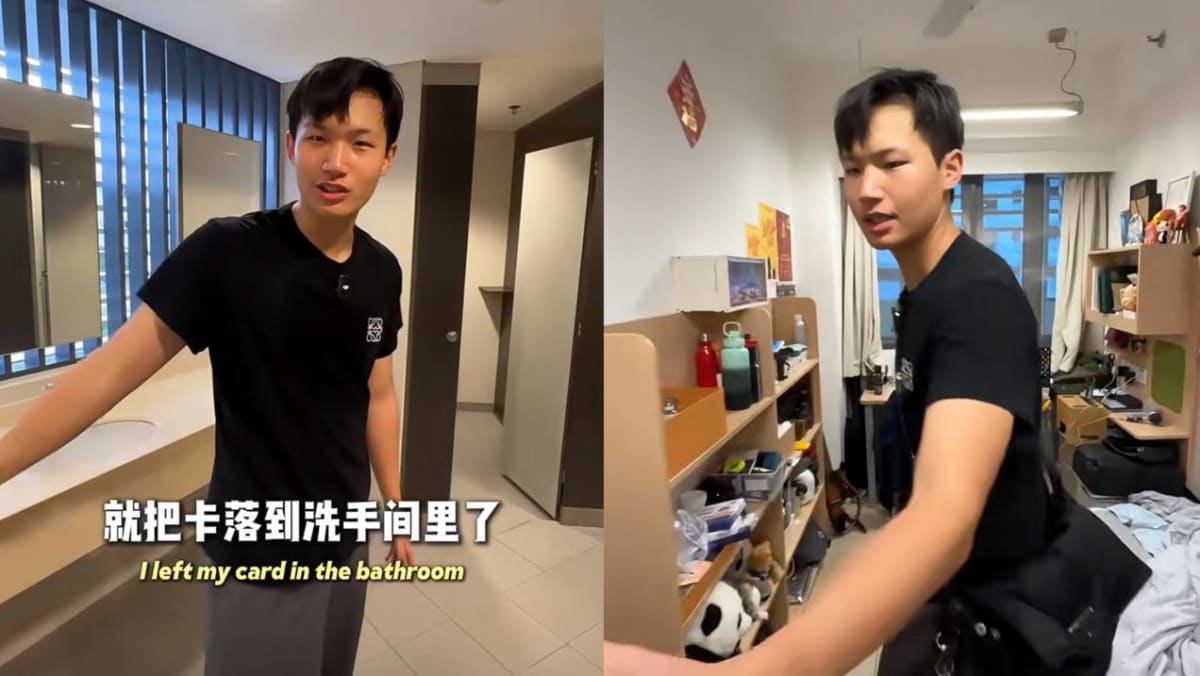Those with friends from Nanyang Technological University (NTU) would probably know about the hostel or “hall” culture there. But do you know how the dorms there actually look like?
In a recent video on Xiao Hong Shu, Chinese content creator ‘Ah Zhe In Singapore’ spoke to a Mainland Chinese student he met at the NTU Hive.
Ah Zhe’s first question to the student was: “How much does your rent in Singapore cost?”
“Just 2000 yuan (S$400) a month,” replied the student, who later revealed he was living in one of the hostels in NTU, which explains the cheap rent.
The student then agreed to take Ah Zhe on a room tour, but not before sharing that he’s from Shenzhen and is currently a Year 3 student at the Nanyang Business School.
According to the video, the student lives in Pioneer Hall, which was built in 2014.
NTU currently has 24 halls, with the first one built in 1957, and the most recent one, in 2019.
Hall fees currently range from $265 to $605, and students can opt for single or double rooms, as well as rooms that come with air-conditioning.
While the newer halls like Pioneer typically have seven to eight floors and have lifts, the older halls aren’t as high and don’t come with lifts.
Though the student shared that his room only costs S$400 a month, according to the NTU website, a single room at Pioneer actually costs S$583 (without aircon) or S$633 (with aircon).
Now, time for the actual tour.
The student first took Ah Zhe through the main gate of the hostel, which requires him to use a key fob to enter.
In case you don’t know, every hall has its own key fob that’s given to its residents. Meaning students from other halls, or visitors cannot choose to enter as and when they like.
He shared that the hostel is split into two sides — one for females and the other for males — and are joined by a bridge.
From the video, it could be seen that the student stays in an air-conditioned single room. The room also comes with a 1.9m x 0.9m single bed, a study table, a wardrobe and ceiling fan.
The student also revealed that he’s the president of the NTU Chinese Students Association, which explains the event posters pasted on the wall in his room.
Next, he took Ah Zhe on a tour of the common toilet, which can only be entered with a key fob.
“I once left my key in the toilet and had to knock on my neighbour’s door to get him to retrieve it for me,” shared the student.
Fun fact: This writer lived in a hall in NTU too, and faced that same situation way too many times…
The student then took Ah Zhe down to the laundry room.
Typically, every block would have at least one laundry room, though the number of washing machines may differ from hall to hall.
For Pioneer Hall’s case, there’s one laundry room every few levels, and each room only comes with one washing machine and one dryer. Each wash costs S$1, while the dryer charges S$1 for every 30 minutes.
“Usually I need to use the dryer for an hour, so in total I’ll spend about S$3-4 on washing and drying my clothes,” he shared.
He also introduced Ah Zhe to their canteen, where he has his meals almost every day. According to him, he spends about S$5-6 per meal there.
Each hall in NTU has its own canteen, which are all open to public. All students and visitors can dine at the canteens even if they’re not residents of that hall.
According to the student, he was actually in Australia for high school before coming to NTU.
He came to Singapore to study as he plans to return to China to work after graduating. He also feels Singapore is more similar to China compared to Australia.
“Plus, NTU is ranked higher [than the school I could have gone to in Australia],” he shared.
Now you must be wondering, how much money does a foreign student need in a month to survive in Singapore?
While that amount differs from person to person, the student shared that he gets a monthly allowance of 11K-16K yuan (S$2-3K).
“It’s because I like to go out with friends to eat and play,” he laughed.
Can someone say… privileged?

